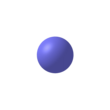Lithium thiocyanate
| |||
| Names | |||
|---|---|---|---|
Other names
| |||
| Identifiers | |||
| |||
3D model (JSmol)
|
| ||
| ChemSpider | |||
| ECHA InfoCard | 100.008.306 | ||
| EC Number |
| ||
PubChem CID
|
|||
CompTox Dashboard (EPA)
|
|||
| Properties | |||
| LiSCN | |||
| Molar mass | 65.02 g/mol | ||
| Appearance | White hygroscopic solid | ||
| Density | 1.44 g/cm3[1] | ||
| Melting point | 274 °C (525 °F; 547 K)[2] | ||
| Boiling point | 550 °C (1,022 °F; 823 K) (decomposition) | ||
| 125 g/100 ml | |||
| Solubility | Soluble in alcohol[1] | ||
| Structure[2][3] | |||
| Orthorhombic (anhydrous, α-monohydrate, dihydrate) Monoclinic (β-monohydrate) | |||
| C2/m (α-monohydrate) Pnam (β-monohydrate) Pnma (anhydrous, dihydrate) | |||
a = 1215.1 pm, b = 373.6 pm, c = 529.9 pm (anhydrous)
| |||
| 4 (α, β-monohydrate) 6 (anhydrous, dihydrate) | |||
| Tetrahederal (α and β-monohydrate) | |||
| Thermochemistry | |||
Std molar
entropy (S⦵298) |
9 e.u.[1] | ||
Std enthalpy of
formation (ΔfH⦵298) |
5.0 kcal/mol[1] | ||
| Hazards | |||
| GHS labelling: | |||

| |||
| Warning | |||
| H302+H312+H332, H412 | |||
| NFPA 704 (fire diamond) | |||
| Related compounds | |||
Other cations
|
Sodium thiocyanate, Potassium thiocyanate | ||
Except where otherwise noted, data are given for materials in their standard state (at 25 °C [77 °F], 100 kPa).
| |||
Lithium thiocyanate is a chemical compound with the formula LiSCN. It is an extremely hygroscopic white solid that forms the monohydrate and the dihydrate. It is the least stable of the alkali metal thiocyanates due to the large electrostatic deforming field of the lithium cation.[1]
Properties and preparation
[edit]Lithium thiocyanate is hygroscopic and forms the anhydrous, monohydrate, and dihydrate, which melts at 274, 60, and 38 °C, respectively.[2] The monohydrate supercools after melting, as it recrystallizes at 36 °C. It is soluble in many organic solvents, such as ethanol, methanol, 1-propanol, and acetone. However, it is insoluble in benzene.[1]
Due to its hygroscopicity, the anhydrous form is hard to prepare. The anhydrous form is usually prepared by the reaction of lithium hydroxide and ammonium thiocyanate, then the water was removed by vacuum, then the resulting solid was dissolved in diethyl ether, followed by adding to petroleum ether to form the ether salt, then it was heated in vacuum at 110 °C to result in the anhydrous salt. The overall reaction is the following:[1]
- LiOH + NH4SCN → LiSCN + NH4OH
The ether can be replaced by THF.[2]
Crystallography
[edit]The monohydrate has 2 forms, the α form, and the β form; the α form reversibly converts to the β form at 49 °C. The α form has the space group C2/m while the β form has the space group Pnam. More info on its crystallography are listed in the table below.
| Compound | LiSCN[3] | α-LiSCN·H2O[2] | β-LiSCN·H2O[2] | LiSCN·2H2O[3] |
|---|---|---|---|---|
| Molar mass (g/mol) | 65.02 | 83.04 | 83.04 | 101.05 |
| Crystal Structure | Orthorhombic | Orthorhombic | Monoclinic | Orthorhombic |
| Space Group | Pnma | C2/m | Pnam | Pnma |
| Lattice constant a (Å) | 12.151 | 15.027 | 13.226 | 5.721 |
| Lattice constant b (Å) | 3.736 | 7.597 | 7.062 | 8.093 |
| Lattice constant c (Å) | 5.299 | 6.707 | 8.166 | 9.66.9 |
| β | 96.147° | |||
| Coordination number | 6 | 4 | 4 | 6 |
| Calculated density (g/cm3) | 1.80 | 1.45 | 1.45 | 1.50 |
References
[edit]- ^ Jump up to: a b c d e f g D. A. Lee (1964). "Anhydrous Lithium Thiocyanate". Inorganic Chemistry. 3 (2). ACS Publications: 289–290. doi:10.1021/ic50012a039.
- ^ Jump up to: a b c d e f Markus Joos; Maurice Conrad; Sebastian Bette; Rotraut Merkle; Robert E. Dinnebier; Thomas Schleid; Joachim Maier (2022). "On the crystal structures of lithium thiocyanate monohydrate LiSCN 1 H2O and the phase diagram LiSCN – H2O". Journal of Physics and Chemistry of Solids. 160. doi:10.1016/j.jpcs.2021.110299.
- ^ Jump up to: a b c Olaf Reckeweg; Armin Schulz; Björn Blaschkowski; Thomas Schleid; Francis J. DiSalvo (2014). "Single-Crystal Structures and Vibrational Spectra of Li[SCN] and Li[SCN] · 2H2O". Zeitschrift für Naturforschung B. 69 (1). De Gruyter: 17–24. doi:10.5560/znb.2014-3220. S2CID 52235581.



